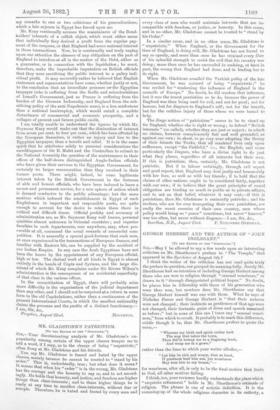MR. GLADSTONE'S PATRIOTISM.
[To THE EDITOR OF THE "SPECTATOR,"] SIR,—Your discriminating analysis of Mr. Gladstoiae's un- popularity among certain of the upper classes tempts me to add a word, if I may, as to the charge of being "unpatriotic," often flung at Mr. Gladstone and his friends.
You say Mr. Gladstone is feared and hated by the upper classes, mainly because he cannot be trusted to "stand by his order." This is, undoubtedly, true ; but what does it mean P It means that when his " order" is in the wrong, Mr. Gladstone has the courage and the honesty to say so, and to act accord- ingly. He holds that honesty, and justice, and freedom are higher things than Class-interests. and to these higher things he is ready at any time to sacrifice class-interests, without fear or scruple. Therefore, he is hated and feared by every man and every class of men who would maintain interests that are in- compatible with freedom, or justice, or honesty. In this sense, and in no other, Mr. Gladstone cannot be trusted to "stand by his Order."
In a similar sense, and in no other sense, Mr. Gladstone is "unpatriotic." When England, or the Government for the time of England, is doing evil, Mr. Gladstone has not feared to say so openly, and more than once he has strained every fibre of his splendid strength to resist the evil that his country was doing; more than once he has succeeded in undoing, at least in part, the wrong that England had done, and in leading her to do right.
When Mr. Gladstone assailed the Turkish policy of the late Government, he was accused of being "unpatriotic ;" he was reviled for "weakening the influence of England in the councils of Europe." No doubt, he did weaken that influence, but it was the truest patriotism so to do, because the power of England was then being used for evil, and not for good; not for honour, but for disgrace to England's self; not for the benefit, but for the ruthless injury of those whom we were bound to help.
The Jingo notion of " patriotism " seems to be to stand up for England, whether she is right or wrong; to defend "British interests" (so called), whether they are just or unjust; to admit no claims, however conspicuously fair and well grounded, as against our own; in short, to go very near adopting the theory of their friends the Turks, that all mankind lives only upon
sufferance, except "the Faithful," i.e., the English, and more particularly the Jingoes, who have a divine right to do just
what they please, regardless of all interests but their own.
If this is patriotism, then, certainly, Mr. Gladstone is not patriotic. But if to labour untiringly, through evil report and good report, that England may deal justly and honourably with her foes, as well as with her friends ; if to hold that the claims of other nations ought to be considered fairly, together with our own ; if to believe that the great principles of moral obligation are binding as much in public as in private affairs, and to act on that belief, whatever it may cost—if this is patriotism, then Mr. Gladstone is eminently patriotic ; and his revilers, who are for ever trumpeting their own patriotism, are really the worst enemies of their own country, men whose policy would bring us " peace " sometimes, but never" honour," war too often, but never without disgrace.—I am, Sir, Sze.,






























 Previous page
Previous page